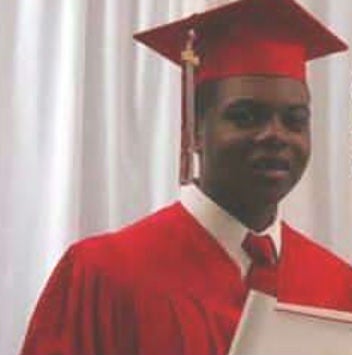
Nine people were arrested for breaching a federal courthouse in Chicago following the release of police officer Jason van Dyke. Van Dyke served less than half his six-year, nine-month sentence for the second-degree murder of Laquan McDonald in 2014.
A group of protesters gathered at Federal Plaza to deliver a letter to US Attorney John Lausch demanding civil rights charges against Van Dyke.
Nine people were arrested inside the Dirksen Federal Building for violating the chief judge’s order for demonstrations, a US Marshals spokesperson told ABC7.
They were released after appearing before a judge on Thursday evening and are due back in court on Tuesday to face federal charges, organizer William Calloway told The Chicago Sun-Times.
Mr Calloway was among the group calling themselves the "Laquan Nine", along with activists including Justin Blake, the nephew of Jacob Blake.
The grandmother of McDonald, Tracey Hunter, was initially detained but released, telling reporters afterwards her "comrades" were fighting for human rights.
"We’re gonna take over the streets and we’re gonna shut down the entire city of Chicago until we get the justice that we deserve,” she said, according to the Sun-Times.
Van Dyke, 43, was released on good behaviour after his 2018 conviction for second-degree murder, plus one count of aggravated battery for each of the 16 shots fired at the 17-year-old.

It was the first murder conviction of a Chicago police officer for an on-duty killing in about 50 years and led to several criminal justice reforms, including the required release of police video within 60 days of a police shooting.
The city had refused to release body camera footage for more than a year until being forced to do so by a court order.
Chicago Mayor Lori Lightfoot in a statement praised the reforms but said there was more needed, adding that Van Dyke’s 81-month sentence "was and remains a supreme disappointment".
State’s Attorney Kim Foxx told The Chicago Tribune that she wasn’t in a position to direct federal prosecutors on charges against Van Dyke, but added his sentence was not appropriate given the seriousness of the crime.
“The sentence put down for Jason Van Dyke does not meet the crime, and if there’s an ability to do something about it on the federal level then by all means something should be done," she told the outlet.
Defence attorney Jennifer Blagg told The Washington Post in an email that Van Dyke had not received preferential treatment and had spent most of his sentence in solitary confinement for his safety.
Before Van Dyke’s release, Blagg told the Tribune that justice is handed out in the courtroom and not in the court of public opinion.
"And even if you don’t agree with it, you have to appreciate the long-term consequences of what you’re arguing for,” she told the newspaper. “Arguing that someone should be charged by the feds because you don’t agree with the judge’s sentencing decision could have far-reaching consequences in our society.”







